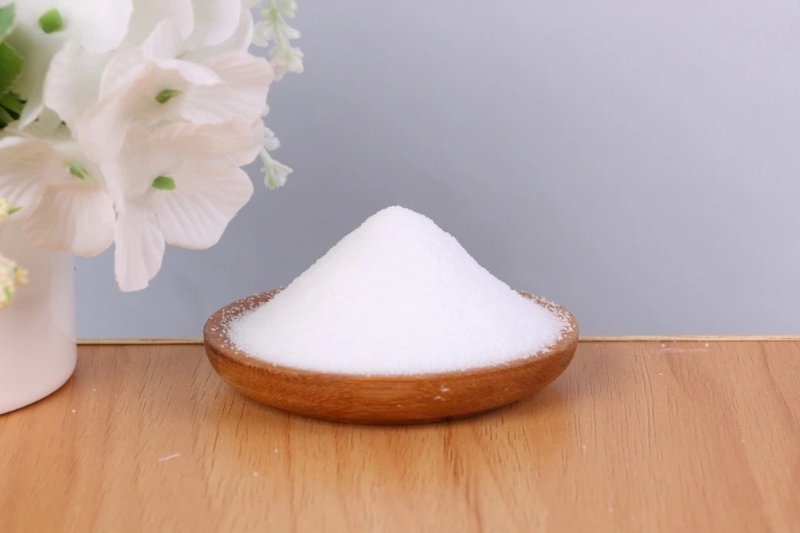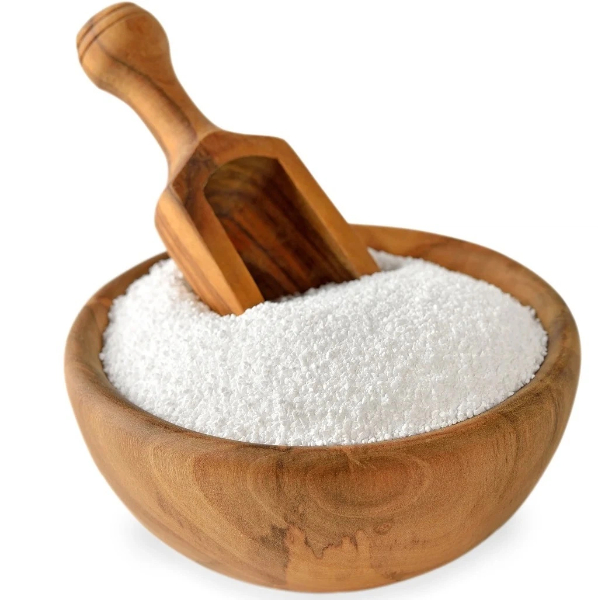Views: 222 Author: Sara Publish Time: 2025-09-02 Origin: Site








Content Menu
>> Chemical Structure & Properties
● Is Sorbitol an Artificial Sweetener or a Natural Sweetener?
● Sorbitol as a Sugar Alcohol Sweetener
>> Key Properties of Sorbitol as a Sugar Alcohol
>> Healthcare and Pharmaceutical Industry
● Potential Side Effects and Safety of Sorbitol
● Sorbitol vs Artificial Sweeteners: Key Differences
● Environmental Impact and Sustainability
● Sorbitol in Blended Sweetener Formulations
● Frequently Asked Questions (FAQs)
>> 1. What is sorbitol and where does it come from?
>> 2. Is sorbitol safe for diabetics?
>> 3. Can sorbitol cause side effects?
>> 4. How does sorbitol differ from artificial sweeteners?
>> 5. Why is sorbitol used in toothpaste and sugar-free gum?
Sorbitol is a sugar alcohol widely used in the food, beverage, and healthcare industries. It serves as a popular sweetening agent, particularly in sugar-free, low-calorie, and diabetic-friendly products. But a common question arises: Is sorbitol an artificial sweetener? This in-depth article explores sorbitol's nature, classification, uses, safety, health effects, and how it compares to other sweeteners.

Sorbitol, scientifically known as glucitol, is a sugar alcohol (polyol) naturally found in many fruits such as apples, pears, peaches, and berries. It possesses a sweet taste similar to sugar but with fewer calories, making it a favored ingredient in sugar-free chewing gums, candies, and oral care products.
Sorbitol's molecular formula is C6H14O6. It is derived from glucose by reducing the aldehyde group to a hydroxyl group. Its chemical structure places it in the sugar alcohol family, characterized by multiple hydroxyl (–OH) groups attached to a carbon chain.
Unlike artificial sweeteners that are chemically synthesized with no natural counterpart, sorbitol can be extracted from natural sources. Commercial production typically involves the hydrogenation of glucose derived from corn syrup, converting the glucose molecule to sorbitol under specific catalysts and conditions.
Sorbitol is a white, crystalline, water-soluble powder with a mild, sweet flavor that is approximately 60% as sweet as sucrose (table sugar). Because of its lower sweetness, it is often blended with other sweeteners in formulations to provide an optimal taste and texture.
The classification of sorbitol depends on its origin and processing:
- Natural Sweetener: Sorbitol occurs naturally in fruits and berries in small quantities. It was first discovered in the berries of the sorbitol-producing plant Sorbus aucuparia (rowanberry).
- Artificial Sweetener: Commercially produced sorbitol is often hydrogenated glucose syrup, which is a processed product. However, it is not chemically synthesized from non-sugar precursors like artificial sweeteners such as aspartame or sucralose.
Thus, sorbitol is technically classified as a natural sugar alcohol sweetener rather than a purely artificial sweetener. Its natural occurrence combined with commercial processing places it uniquely between unprocessed natural sugars and fully synthetic sweeteners. Therefore, when answering the question "Is sorbitol an artificial sweetener?" the answer is No; sorbitol is a sugar alcohol of natural origin with some processing.
Sugar alcohols—also called polyols—are carbohydrates that chemically contain elements of sugar and alcohol. They provide bulk and sweetness with fewer calories than sugar. Along with sorbitol, common sugar alcohols include xylitol, maltitol, erythritol, mannitol, and lactitol.
- Lower Caloric Content: Sorbitol provides approximately 2.6 calories per gram, compared to 4 calories per gram in regular sugar. This makes it valuable in reducing calorie counts in food and drinks.
- Low Glycemic Index: Sorbitol is absorbed more slowly and incompletely in the small intestine. Its partial metabolism results in a lower rise in blood sugar and insulin levels compared to glucose or sucrose.
- Non-Cariogenic: Sorbitol does not ferment in the mouth by oral bacteria, which means it does not contribute to tooth decay and dental cavities.
- Humectant Properties: It helps retain moisture in products, contributing to texture and prolonging freshness.
Due to these features, sorbitol is widely used as a sugar substitute—especially in sugar-free and diabetic-friendly products—and as a humectant and bulking agent in pharmaceuticals and cosmetics.

Sorbitol's unique properties have led to extensive use in various food and beverage products, especially those targeted toward health-conscious consumers:
- Sugar-Free Chewing Gums: Sorbitol provides sweetness, mouthfeel, and prevents the formation of dental caries.
- Diabetic-Friendly Candies and Sweets: The low glycemic impact makes it a preferred sugar alternative.
- Sugarless Baked Goods: Sorbitol contributes to sweetness and retains moisture, improving product shelf life.
- Soft Drinks and Diet Beverages: Used singly or blended with high-intensity sweeteners to adjust sweetness profiles.
- Ice Cream and Frozen Desserts: Acts as a sweetener and texture enhancer, preventing crystallization.
Sorbitol is employed in multiple healthcare applications:
- Excipient in Pharmaceutical Tablets: It serves as a binder, stabilizer, and sweetener in oral medications.
- Laxative Agent: At higher doses, sorbitol draws water into the colon by osmosis, functioning as an effective osmotic laxative.
- Oral Care Products: Found in toothpaste, mouthwash, and sugar-free lozenges for its sweetening and moisture-retention properties.
Its versatility and safety have made sorbitol a staple ingredient across various healthcare formulations.
One of the most important advantages of sorbitol is its low glycemic index (GI), which makes it a valuable sugar substitute for individuals managing diabetes or insulin resistance. Unlike glucose or sucrose, sorbitol is slowly absorbed and largely metabolized by the liver, reducing spikes in blood sugar and insulin.
By providing fewer calories per gram compared to sucrose, sorbitol can contribute to calorie control strategies in weight management without compromising sweetness or palatability.
Unlike fermentable sugars, sorbitol is not broken down by oral bacteria to acids that cause tooth enamel erosion. Regular use of sorbitol-sweetened products reduces dental plaque formation and the risk of cavities, supporting oral health.
Sorbitol is generally recognized as safe (GRAS) by regulatory authorities such as the U.S. Food and Drug Administration (FDA) and the European Food Safety Authority (EFSA). It has decades of safe use history in foods and pharmaceuticals.
However, as a sugar alcohol, sorbitol is only partially absorbed in the intestine. When consumed in large amounts, it can ferment in the colon and exert an osmotic effect, leading to gastrointestinal symptoms such as:
- Bloating
- Gas
- Abdominal pain
- Diarrhea
These effects usually occur at doses above 20 to 50 grams per day depending on individual tolerance. To avoid these side effects, most products containing sorbitol include usage recommendations or warnings, especially for children.
People with irritable bowel syndrome (IBS) or fructose malabsorption may also be particularly sensitive to polyols like sorbitol.
| Feature | Sorbitol | Artificial Sweeteners (Aspartame, Sucralose, Saccharin) |
|---|---|---|
| Origin | Naturally occurring sugar alcohol, processed from glucose | Chemically synthesized molecules with no natural counterpart |
| Caloric Content | ~2.6 kcal/g | Generally non-caloric or negligible calories |
| Sweetness Intensity | ~60% as sweet as sugar | 100-7000 times sweeter than sugar |
| Metabolic Effect | Provides some energy, low glycemic index | No impact on blood sugar or insulin levels |
| Taste Profile | Mildly sweet, with no significant aftertaste | Can have intense sweetness, sometimes with bitter or metallic aftertaste |
| Safety Concerns | GI discomfort if consumed in excess | Generally safe; some past controversies but approved by authorities |
This comparison illustrates that sorbitol occupies a different functional and metabolic niche than true artificial sweeteners, combining some caloric value with fewer drawbacks.
Sorbitol production is mainly based on renewable plant sources such as corn or wheat due to the fermentation or enzymatic conversion of glucose in these crops. This gives sorbitol a more sustainable profile compared to fully synthetic sweeteners derived from petrochemicals.
Moreover, ongoing improvements in biotechnological processes aim to increase efficiency and reduce environmental footprints in large-scale sorbitol manufacturing.
In order to optimize sweetness profiles, cost-effectiveness, and product texture, sorbitol is commonly blended with other sweeteners and functional ingredients in food formulations:
- With high-intensity sweeteners such as stevia or sucralose to compensate for its mild sweetness and improve taste.
- With other sugar alcohols like erythritol and maltitol to balance sweetness levels and minimize digestive effects.
- With dietary fibers or functional additives to enhance texture, stability, and health benefits.
Blended sweetener systems help manufacturers create superior consumer products that meet nutritional claims while maintaining taste and texture expectations.
Sorbitol is a naturally occurring sugar alcohol sweetener extracted and processed primarily from glucose-rich sources. Unlike fully synthetic artificial sweeteners such as aspartame or sucralose, sorbitol is neither chemically manufactured from non-sugar precursors nor intensely sweet. It provides a moderate level of sweetness with fewer calories than sugar and carries functional benefits like low glycemic impact and dental safety.
Its widespread use in sugar-free foods, beverages, pharmaceuticals, and oral care products underscores its important role as a healthier alternative sweetener. However, sorbitol should be consumed in moderation due to potential gastrointestinal side effects in large amounts.
In essence, sorbitol is not an artificial sweetener but a naturally derived sugar alcohol that bridges the gap between traditional sugars and synthetic sweeteners—offering manufacturers and consumers a versatile, safe, and functional ingredient that supports health-conscious product innovation.

Sorbitol is a sugar alcohol naturally found in many fruits like apples, pears, and berries. Industrially, it is produced by the hydrogenation of glucose derived mainly from corn syrup.
Yes. Sorbitol has a low glycemic index and is absorbed slowly, causing minimal impact on blood sugar levels, making it suitable for diabetics when consumed within recommended amounts.
Excessive consumption of sorbitol can cause digestive discomfort such as bloating, gas, and diarrhea because it acts as an osmotic laxative in large quantities.
Sorbitol is a naturally occurring sugar alcohol with moderate sweetness and caloric content, whereas artificial sweeteners are synthetically produced, intensely sweet compounds with almost no calories.
Sorbitol provides sweetness without promoting tooth decay. It also retains moisture and improves texture, making it ideal for oral care products like toothpaste and chewing gum.
